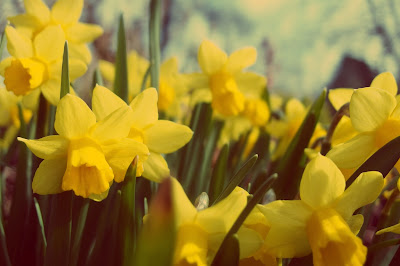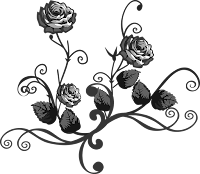It's St. David's Day - so what better time to finally give you all the low-down on why I'm hesitant, as a Welsh person, to read Maggie Stiefvater's Raven Cycle.
OK, before we get into the 'but you haven't read it so you can't judge it!' sh**, these are the reasons I'm hesitant to read it.
I may eventually read it. If I can bring myself to. One day.
(And if that day should ever come, I'll tell you what I think! But don't expect me to be overly happy with it - see my reasons below.)
And honestly, if you liked the books then that's fine - dudes, I have zero problem with you liking what you like.
OK, the number one problem is the name Owen Glendower. It should be Owain Glyndŵr.
What's the difference? Anglicisation my friends, which is offensive - especially when it comes to a real historical figure and freedom fighter like Glyndŵr. (More on the man himself later.)
I'm not as bothered by the changing of Owain to Owen - it should be Owain, but Owen and Owain are somewhat interchangeable. So I'm willing to give Stiefvater leeway on that point.
The Glyndŵr to Glendower though? *shudders*
I should explain that Maggie Stiefvater was asked this very question on Tumblr in 2015, and answered in a way that suggests to me that she doesn't understand the culture she was writing in this series.
Glyndŵr means (roughly) 'water banks.'
It's a common Welsh naming tradition (or was) to be given a name related to where you live.
Glendower is gibberish. It has no meaning in the language, it's just a corruption to make it more palatable to English people.
I know that not many of you have ever spoken Welsh or pronounced Welsh words, but trust me, Glyndŵr is a natural flow. 'Glendower' is a tainted jolt to the system.
''Glendower' is a tainted jolt to the system...' Click to Tweet
But what about what Stiefvater said on Tumblr about us not knowing Glyndŵr's 'true' name?
What Maggie said:
'Interestingly, Owain Glyndŵr wasn’t necessarily even the true name of our recumbent king. He’s also known as Owain ap Gruffydd or Owain Glyndyfrdwy, and centuries of historians have used all versions interchangeably, sometimes within the same document.'
In honesty, her response troubles me. Because she clearly has no understanding of Wales or Welsh history.
Until the 19th Century (1837, actually,) across the whole of the UK, there was no such thing as a legal name, because there were no birth certificates.
Glyndŵr lived in the 14th and 15th Centuries - which was before all that civil registration stuff.
Even after the 19th Century, the Welsh had legal names, and then, sometimes, other names - all of which are 'true' names.
The first name she mentioned, Owain ap Grufydd, is a patronymic.
For a start, it should be Gruffydd, not Grufydd - f and ff are different letters in Welsh.
Owain ap Gruffydd means Owain, son of Gruffydd. It literally means his father was Gruffydd.
It's perfectly acceptable to have this name and another name, and the patronymic system is still used by some today, with or without it being written on their birth certificate.
Owain Glyndyfrdwy is a more specific geographical name.
Afon Dyfyrdwy is the Welsh (and original) name of the now-Anglicised River Dee.
Remember how earlier I said his name meant 'water banks' - this version of the name is just being specific about what water. It means 'the banks of the River Dee.'
It may be difficult for non-Welsh people to understand, but the surname Glyndyfrdwy, in this instance, is the same as the surname Glyndŵr. Glyndŵr is just the short version.
But Stiefvater didn't use Glyndyfrdwy, or ap Gruffydd. She used Glendower.
So, apparently she knew there were three names, and added the fourth - offensive - name instead.
True, as she points out, she was by no means the first. But Shakespeare wasn't Welsh either. And that she should be so ignorant of what the Anglicisation means makes me worry for the actual books.
Oh and English-speaking Welsh people? We don't generally call him Glendower. Only English people, who haven't yet beenslapped repeatedly with a slice of bara brith* been taught better, call him that.
Oh and English-speaking Welsh people? We don't generally call him Glendower. Only English people, who haven't yet been
*bara brith is kind of a fruit loaf... it's a special kind of bread, basically - it's really nice.
So, what's the problem with Anglicisation anyway?
Look, I get it - Welsh is difficult to pronounce.
We have funny extra letters like 'Ll' and 'Ng' which should not be attempted without instruction, but English is a freaking weird language too (and I'm saying this as a first-language-English person.)
We have funny extra letters like 'Ll' and 'Ng' which should not be attempted without instruction, but English is a freaking weird language too (and I'm saying this as a first-language-English person.)
The problem with Anglicisation is that we are not English.
And Anglicisation marks every moment we've had to change our own language, just to suit the English.
It's a reminder of our history - of every time a kid was caned in school for speaking Welsh, every time the language was claimed to be literally making us stupid, every time a Welsh name was changed because we're not in charge in our own country.
And Anglicisation marks every moment we've had to change our own language, just to suit the English.
It's a reminder of our history - of every time a kid was caned in school for speaking Welsh, every time the language was claimed to be literally making us stupid, every time a Welsh name was changed because we're not in charge in our own country.
And yes, we've had to change our names. One of my ancestors was named Dafydd Sion. On every official document his name is David John. Welsh names often weren't acceptable to English officials.
Our language has been suppressed, changed, and ridiculed. Because the English invaded several centuries ago, and haven't let us forget it since.
Look, like most in the South, I have more than a few drops of y Saeson running through my veins.
But I was born here. I am Cymry, not Saeson.
I have a fair amount of Cymry in my veins too, but I speak Saesneg, and only a little Cymraeg.
I have a fair amount of Cymry in my veins too, but I speak Saesneg, and only a little Cymraeg.
The reason? My grandmother's parents - both fluent Cymraeg speakers - made the decision that their children would never get on in life if they were first-language Welsh.
Welsh was seen as a language that literally made it's speakers stupid. Even now, if you want to sound 'posh' or 'professional,' what people mean is 'sound more English, sound less Welsh.'
And first language Welsh often leaves the odd cue in the accent to show that it's there - 'eu' pronounced as 'ew' etc.
Therefore, to bring a child up speaking Welsh could leave an inflection, even when speaking English, and it would be possible to be passed over for jobs, promotion, etc., just because of that.
Anglicisation is especially irritating and frustrating when it comes to Glyndŵr, who was fighting to free us from English rule.
Do you get that? He was a rebel, a self-declared prince. He wanted freedom from the English.
He called a parliament at Machynlleth (no, don't attempt to say it unless you've heard it said, you'll just hurt yourself! 😉) and wanted self-governance for the Welsh people.
'He was a rebel, a self-declared prince...' Click to Tweet
Owain was also NOT a king.
The closest there has been to a King of Wales was Hywel Dda in the 10th Century, but he did not rule Morgannwg.
What we had were princes - occasionally called kings of their individual territories.
The prince with the most land, and therefore the most ability to moderate between all the others, was the Prince of Wales.
The last True Prince of Wales was Llywelyn ap Gruffudd, Tywysog Cymru.
Owain was a self-declared Prince of Wales - had his rebellion been successful, perhaps he would have been confirmed as prince in truth, but it wasn't to be.
But wait, isn't Prince Charles the Prince of Wales?
When Llywelyn was murdered by the English crown, the English king transferred the title to his own son. The heir to throne has held this stolen title since that time.
Prince Charles is not the True Prince of Wales.
OK, let's look briefly at my other problems with this series:
The Goodreads synopsis of The Raven Boys says:
'“There are only two reasons a non-seer would see a spirit on St. Mark’s Eve,” Neeve said. “Either you’re his true love . . . or you killed him.”
It is freezing in the churchyard, even before the dead arrive.
Every year, Blue Sargent stands next to her clairvoyant mother as the soon-to-be dead walk past. Blue herself never sees them—not until this year, when a boy emerges from the dark and speaks directly to her.'
I have no idea why the St. Mark's Eve stuff is there (what even is that?), but it's totally possible for 'non-seers' to see spectres.
OK, we're traditionally big on divination here. It looks like Stiefvater has smashed some of our divination rituals into a phantom funeral and hoped for the best. *face palms*
Also, Neeve, as a name, is a) Irish, not Welsh and b) spelt Niamh.
And none of the rest of the names that I've seen seem in any way Welsh or British - they're more something you'd find in America or Ireland.
Sorry. Nitpicking I know, but it's the kind of thing that would really bug me if I read the books.
Ooh! Someone online briefly mentions a Gwenllian? That is a Welsh name - a good, strong, girl's name, meaning (very roughly) 'sacred brook.'
Update: Apparently most of the book is set in Virginia, so I'm even less bothered about the other names now.
I don't know how Stiefvater uses ravens here... but I'm wary.
Birds, and the crow family in particular, play a large part in our folklore and mythology. They are the way between worlds, often magical, and should be respected.
Quite often, they're also people. Or warriors. Or Fair Folk. Or even (if you go back enough in our traditions) gods or goddesses.
I actually really liked the way Miss Peregrine's Home For Peculiar Children used birds, because it was respectful of our traditions, as well as putting Ransom Riggs' own spin on things - I loved the way he used shifters as guardians.
From what I've seen of the way Stiefvater understands, or doesn't, as the case may be, Welsh culture, I'm hesitant of how she'll handle brain (crows - of any and all types) in her books.
Maybe you think I'm making mountains out of mole-hills - but things being incorrect like this is likely to bug me the whole time I'm reading.
(Plus, could she not have added a historical note?! I mean, dude, really!)
Like this post? Try these:
- Welsh Halloween Traditions
- My Diverse Welsh Authors TBR
- Reading Roald Dahl in Welsh (Part 1)
- Reading Roald Dahl in Welsh (Part 2)




















